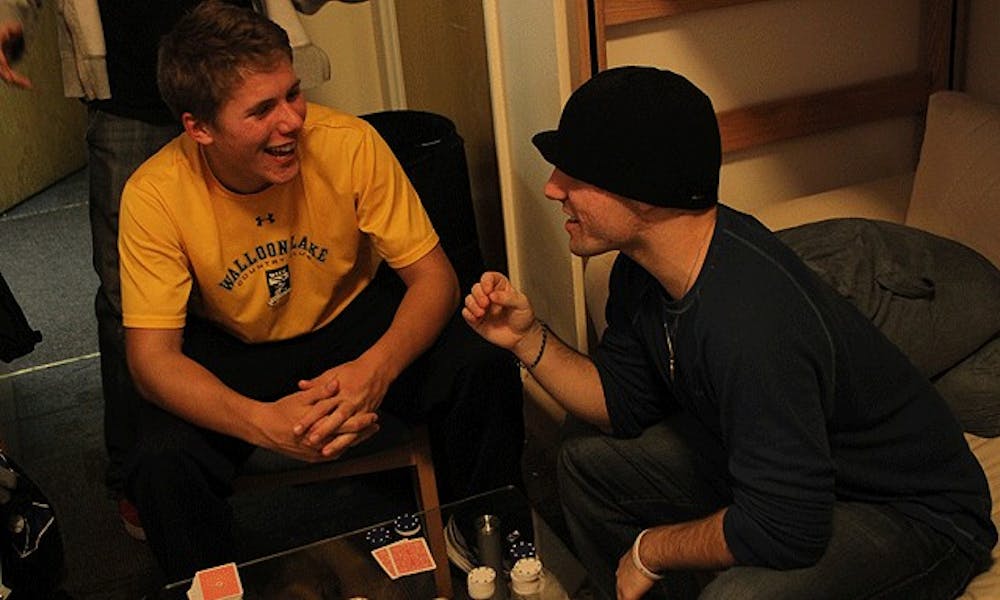In an ongoing debate about the value of the undergraduate experience, a recent report suggested that at many colleges, a prevalent social scene comes at the cost of education.
Recent publications have said this generation’s college students prioritize socializing over studying in the academic spectrum—spending 75 percent of their time sleeping or socializing and only 16 percent in class or studying. Students spend their remaining time eating and participating in extracurricular activities, the study reported.
With the price of a college education constantly rising, many wonder whether the gains of an undergraduate education are worth the cost. For many Dukies, however, the college experience is not as black and white as the study portrays.
“It seems that many people are coming to college for the sake of spending four years doing something they think they’re supposed to do,” said freshman Michael Oliver. “Education does not mean taking classes for the sake of taking classes or joining a career track because it’s easier than taking risks with your future career.... And we definitely shouldn’t live from frat party to frat party.”
The findings about typical college schedules were featured in a book that was published this month titled “Academically Adrift: Limited Learning on College Campuses,” which interviewed more than 3,000 full-time college students from 29 campuses nationwide. Throughout their four years in college, the participants of the study took a learning assessment test, a standardized exam that gauged students’ critical thinking, analytical reasoning and writing skills.
The study reports that 45 percent of students showed no significant gains in learning after their first two years, and that 36 percent showed little change after the full four years. The authors, Richard Arum and Josipa Roska, concluded that the trend is due to a collective shift in attention from educational pursuits to social endeavors.
“Compared to past generations, the education system seems to have become much more ends-oriented, and partially due to cultural self-confidence we no longer feel the academic urgency our parents did to compete globally,” said freshman Andy Chu.
A supporting statistic from the book shows that this generation’s college students dedicate half as much time to their studies as their parents did. Today’s students spend much more time studying in groups, which results in fewer gains in learning than those who spend more hours studying by themselves.
Steve Nowicki, dean and vice provost of undergraduate education, said he is not deeply persuaded by the study.
“I think the problem is that you can’t measure value by some of their methods. You can’t quantify how a student’s life has been changed or the satisfaction of civic engagement,” said Nowicki, who said he was familiar with the recent book. “An academic environment like the one we provide brings out the potential in people by providing an academic haven for constant interaction with people of diverse backgrounds including socioeconomic situations.”
President Richard Brodhead echoed Nowicki’s sentiment. He said he thought the study oversimplified a multi-faceted problem, adding that he believes an undergraduate education is a “million-sided, complicated process” that is hard to calculate.
“Every hour of every day is part of a process of education,” Brodhead said.
He added that the study aims to equate all schools under the generalized conclusions it drew. He emphasized, however, that Duke has the luxury of being highly selective, choosing “smart, lively, energetic” students every year from an increasingly competitive pool.
“There are definitely many students who are here to work and participate very little in social activities,” said Alexandra Ashinoff, a sophomore. “At the same time, there are definitely students who take the easiest classes to give themselves the least work. The driven students may not be as evident unless you go to the library.”
Although partiers may be more visible, Ashinoff said they are just a “loud minority.”
Nowicki stressed that Duke is first and foremost an academic institution. Immersion in the college environment is crucial for developing life skills, he added.
“People are having a hard time getting jobs, and tuition prices are a large sum to pay without the guarantee of getting a job,” he said. “But when I look back on my college experience at Tufts [University], I cannot remember much about what I learned in classes specifically... but I cannot possibly imagine being successful without [that] education.”
Get The Chronicle straight to your inbox
Signup for our weekly newsletter. Cancel at any time.

